7 API Creator Tools to Try in 2024
Discover the top 7 API creator tools to streamline your workflow in 2024. Improve efficiency and save time with these powerful tools.

In today's interconnected digital world, APIs (Application Programming Interfaces) are pivotal in enabling developers and businesses to achieve higher levels of efficiency, productivity, and innovation. These essential tools facilitate smooth communication between various software applications, making them indispensable in modern technology.
API creator tools have become vital in the development process, simplifying and expediting the design, implementation, and management of APIs for developers. As we progress through 2024, numerous innovative and advanced API creator tools have emerged to address the growing needs of the industry.
This comprehensive guide will explore seven exceptional API creator tools that are making a significant impact in 2024. We aim to provide an in-depth analysis of each tool, showcasing its distinct features, advantages, and use cases, enabling you to decide when to select the most appropriate tool for your needs.
Join us on this journey as we reveal these state-of-the-art solutions and learn how they can revolutionize your API development efforts, transforming them into streamlined, efficient, and enjoyable experiences. Without further delay, let us delve into the realm of API creator tools and uncover the top seven contenders worthy of your attention in 2024.
What is API?
An Application Programming Interface, or API, is an intricate and sophisticated mechanism that facilitates seamless interaction between distinct software applications. It essentially serves as a contractual intermediary, defining rules, protocols, and standards through which various software components communicate and exchange data. In the context of software development, APIs enable developers to efficiently integrate, extend, and reutilise pre-existing functionalities of other systems, thus significantly expediting the development process whilst ensuring optimal code maintainability.
For instance, consider the integration of Google Maps API into a mobile application to provide location-based services; this enables the developer to harness the power of Google's mapping technology without the need to build a bespoke mapping solution from scratch. APIs have thus become indispensable in contemporary software engineering, fostering interoperability, modularity, and innovation within the ever-evolving digital landscape.
What is API creator?
An API creator, or API development platform, is an advanced and comprehensive software toolset tailored towards expediting the creation, testing, and management of bespoke Application Programming Interfaces (APIs). These platforms facilitate the development of booming and scalable APIs whilst adhering to best practices and industry standards, ultimately empowering developers to seamlessly integrate, extend, and reutilise functionalities of other software systems. By providing a cohesive environment replete with intuitive user interfaces, pre-built templates, and automation capabilities, API creators significantly reduce the complexity and time associated with API development whilst simultaneously ensuring consistency, reliability, and maintainability. For instance, platforms such as Swagger, Postman, and AppMaster offer an array of tools, ranging from API design and documentation to testing, monitoring, and security enforcement, thereby enabling developers to focus on crafting innovative solutions whilst safeguarding the integrity of the underlying software infrastructure.
How does API creator work?
An API creator operates through a meticulous amalgamation of tools and functionalities designed to streamline the development, testing, and management of Application Programming Interfaces (APIs). Its modus operandi hinges upon a systematic and coherent approach that encompasses various stages of the API lifecycle, ensuring a robust and efficient output. Initially, the API creator facilitates the design phase, where developers utilise graphical interfaces or domain-specific languages to define the API's endpoints, data structures, and interaction protocols. Subsequently, the platform generates relevant code, often in multiple programming languages, to expedite the implementation process.
Moreover, the API creator furnishes comprehensive documentation, elucidating the API's purpose, usage, and expected behaviour, which serves as an invaluable resource for fellow developers and fosters seamless integration. To ensure reliability and stability, the platform offers a suite of testing and validation tools, enabling developers to rigorously scrutinise the API's performance, security, and compliance with industry standards. Finally, the API creator assists in the deployment and management of the API, providing essential monitoring, analytics, and versioning capabilities, thus ensuring the API's continued efficacy and adaptability within the ever-evolving digital ecosystem.
Best API design tools
API design tools play a crucial role in the world of software development, streamlining the process of designing, developing, and managing APIs.
Postman
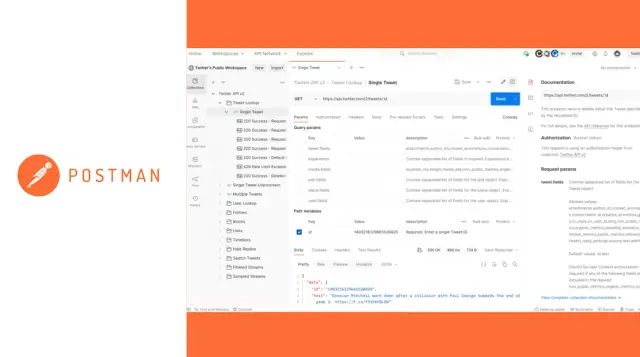
Postman is a widely-used API development environment that simplifies the process of building, testing, and documenting APIs. It supports designing, mocking, debugging, and monitoring APIs, providing developers with a comprehensive toolset to create and maintain APIs more efficiently. Postman also features collaboration tools, allowing teams to work seamlessly on API projects. Moreover, it supports a wide variety of API formats, including REST, GraphQL, and SOAP.
Swagger Editor or Swaggerhub
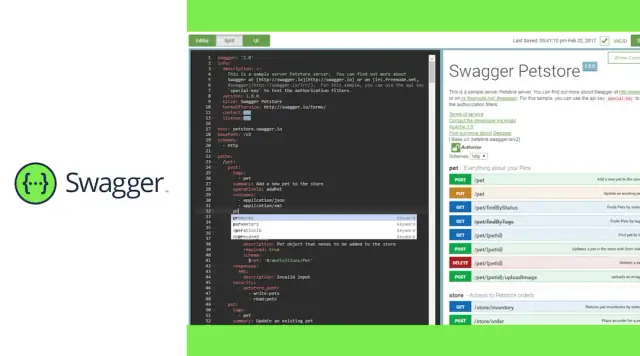
Swagger Editor and Swaggerhub are tools from the Swagger framework that facilitate API design and documentation. Swagger Editor is an open-source, browser-based editor for designing and documenting APIs using the OpenAPI Specification. It provides real-time validation and auto-completion features, helping developers create accurate and compliant API specifications. Swaggerhub, on the other hand, is a collaborative platform that offers advanced features like versioning, access control, and API lifecycle management. Both tools support the generation of client SDKs and server stubs in various languages, enabling rapid API development and testing.
AppMaster
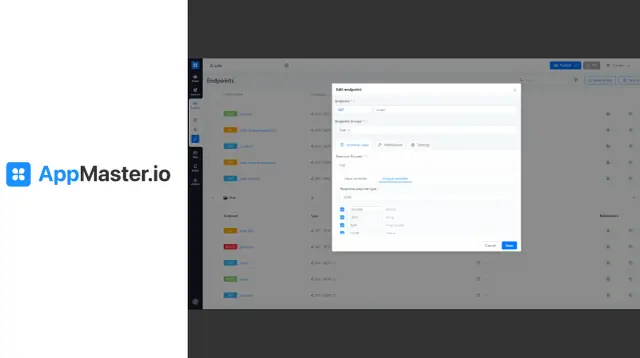
AppMaster is no-code tool with an API design function that helps developers create endpoints crucial for server applications to interact with user interfaces and external systems. Creating an endpoint in AppMaster involves navigating to the "Endpoints" section and initiating a new REST API type endpoint. This endpoint adheres to RESTful principles and uses JSON for data transmission.
AppMaster enables the linking of endpoints to business processes, automatically associating them with incoming and outgoing variables. This simplifies data exchange between server applications and clients. Endpoints feature configurable settings, including Middleware, a software layer executed with every request to the endpoint. Middleware typically houses service-related functions, such as authorization components.
For security, it is essential to have proper authorization for each endpoint, allowing only specific user groups to access them. This minimizes the risk of exploitation by malicious actors. After configuring the endpoint, saving it completes the backend setup.
Mulesoft API Connect
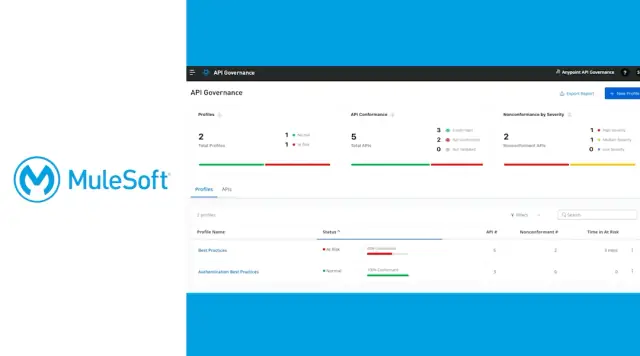
Mulesoft API Connect is a powerful API management solution that offers tools for designing, building, and managing APIs. It enables developers to design APIs using RAML or the OpenAPI Specification and provides features like mocking, testing, and generating API documentation. Mulesoft API Connect also offers built-in integration with Anypoint Studio, allowing developers to implement and test their API designs easily. Additionally, it provides API management capabilities, including analytics, access control, and API lifecycle management.
RapidAPI
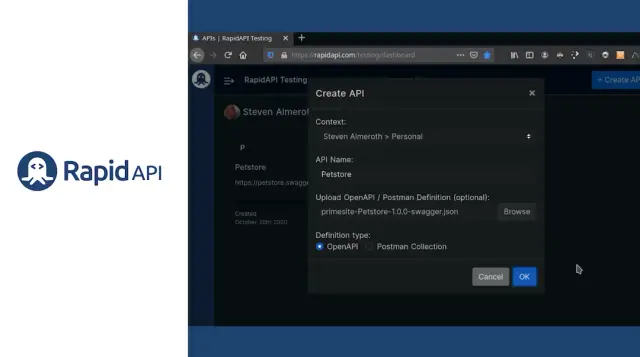
RapidAPI is a comprehensive API platform that enables developers to discover, connect, and manage APIs. It offers a marketplace where developers can access thousands of APIs from various providers, simplifying the process of integrating APIs into applications. RapidAPI also provides tools for designing, building and managing APIs, including features like API documentation, versioning, and access control. It supports various API formats, such as REST, GraphQL, and SOAP.
Stoplight
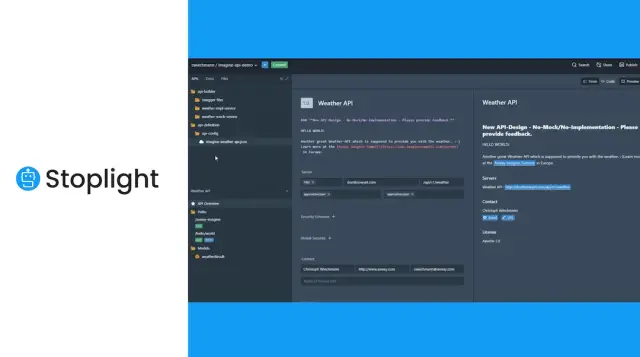
Stoplight is an API design and development platform that offers tools for designing, testing, and documenting APIs. It supports the OpenAPI Specification and provides visual editing capabilities, making it easy for developers to create and maintain API designs. Stoplight also offers features like API mocking, testing, and documentation generation. The platform enables API lifecycle management, allowing teams to collaborate effectively on API projects.
Curl
While Curl is not an API design tool per se, it is a widely used command-line tool for interacting with APIs and is essential for developers to test and debug their API designs. Curl supports various protocols, including HTTP, HTTPS, FTP, and more, enabling developers to send requests and analyze responses from APIs. It is especially valuable for testing API endpoints during the development process, providing insights into the behavior and performance of APIs. Curl can be easily integrated into development workflows, and its simplicity makes it a popular choice for API testing and debugging among developers.
In closing
The ever-evolving digital landscape has rendered APIs an indispensable component of modern software development, fostering efficiency, productivity, and innovation. API creator tools have emerged as a vital solution to address the growing demand for streamlined API development processes, offering an impressive array of features and capabilities tailored to the industry's unique requirements. This comprehensive guide has illuminated seven exceptional API creator tools that have significantly impacted 2024, elucidating their distinctive attributes and use cases. As we stride forth into the increasingly interconnected digital realm, these state-of-the-art API creator tools will indubitably continue to revolutionise the way developers and businesses operate, paving the way for unbridled growth and technological advancement.






